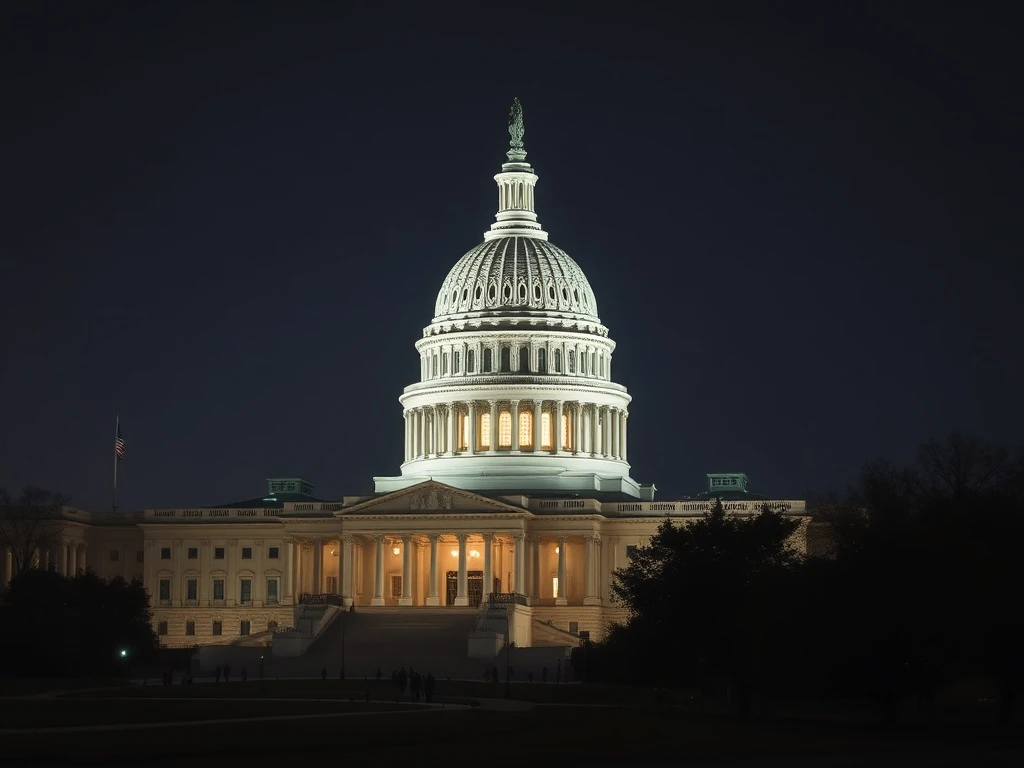Trump Bill Vote-a-rama: Senators Jam Crypto Clauses Amid Fierce Debate

The United States Senate is currently locked in an extended session, navigating amendments to President Donald Trump’s significant tax and spending legislation, often referred to as the Trump bill. This late-night “vote-a-rama” process has become a focal point for lawmakers pushing various agendas, including crucial changes potentially impacting the world of digital assets and cryptocurrency regulation.
Crypto Tax Amendments Take Center Stage in Senate
As senators propose hundreds of amendments, one area receiving significant attention involves potential adjustments to how cryptocurrencies are taxed. Republican Senator Cynthia Lummis has introduced a notable amendment aimed at reforming the current crypto tax framework, which she argues unfairly burdens digital asset users and businesses.
According to details shared from Senator Lummis’s office, her proposed changes include several key provisions:
- Waiving taxes on small crypto transactions under $300, with an annual cap of $5,000. This aims to make using crypto for everyday purchases more feasible without immediate tax implications.
- Excluding most crypto lending agreements from being taxed as taxable events upon origination.
- Stipulating that crypto earned from activities like airdrops, mining, and staking would not be taxed until it is sold or exchanged.
- Applying the 30-day wash sale rule to digital assets, preventing individuals from selling an asset for a loss and immediately repurchasing a substantially similar one within a 30-day window before or after the sale.
Senator Lummis stated her goal is to end “unfair tax treatment” and ensure Americans can interact with digital assets without constant concern over tax violations, particularly addressing the issue of miners and stakers potentially being taxed twice.
Senate Crypto Debate: Ban on Officials Owning Digital Assets Rejected
Earlier in the intense session, the Senate addressed another crypto-related amendment, this one proposed by Democratic senators Jeff Merkley, Elizabeth Warren, and Jack Reed. This amendment sought to impose a strict ban on government officials, including the President, Vice President, members of Congress, and their immediate families, from owning or promoting a wide range of digital assets, including cryptocurrencies, memecoins, tokens, NFTs, and stablecoins.
The proposal also included a one-year restriction for former special government employees, a provision that could notably affect individuals like Elon Musk who previously held advisory roles. However, this amendment was ultimately shot down by the Senate.
Senator Cynthia Lummis was among those opposing the ban. While acknowledging the underlying ethical concerns, she argued the proposal went too far and could negatively impact American innovation and competitiveness in the digital asset space. She suggested such a restrictive measure could send a message that the U.S. is not open to business in this evolving technological sector.
Broader Crypto Regulation Context and Political Reactions
The inclusion and debate of these crypto-specific amendments highlight the growing importance of crypto regulation within mainstream political discourse. Lawmakers are grappling with how to integrate digital assets into existing legal and financial frameworks, covering everything from taxation to potential conflicts of interest for public officials.
The contentious nature of the overall Trump bill, particularly concerning its estimated impact on national debt, has also drawn sharp criticism from figures like Elon Musk. Musk, who previously advised the administration, has publicly voiced strong opposition to the bill’s spending provisions. In a notable reaction, he threatened to form a new political party, the “America Party,” if the bill passes, expressing dissatisfaction with both major existing parties.
Musk’s stance underscores the broader political friction surrounding the bill and, by extension, the complex legislative environment in which potential crypto policy changes are being debated. His comments reflect a sentiment among some that the government’s fiscal policies are unsustainable, a viewpoint that can sometimes intersect with interest in alternative financial systems like cryptocurrencies.
What’s Next for Crypto Clauses in the Trump Bill?
As the Senate’s vote-a-rama continues, the fate of Senator Cynthia Lummis‘s crypto tax amendment remains uncertain. Its potential passage would represent a significant step towards clarifying and potentially easing the tax burden on crypto users and businesses, addressing long-standing concerns from the industry.
Conversely, the rejection of the ban on officials’ digital asset holdings indicates that while ethical considerations exist, there is also significant resistance to measures seen as overly restrictive or potentially harmful to the developing digital asset ecosystem. The ongoing debate within the Senate reflects the multifaceted challenge of establishing clear and effective crypto regulation in a rapidly evolving technological and financial landscape.
The outcome of this legislative marathon will provide further insight into the direction of U.S. policy regarding digital assets, influencing how individuals and businesses interact with cryptocurrencies moving forward.









